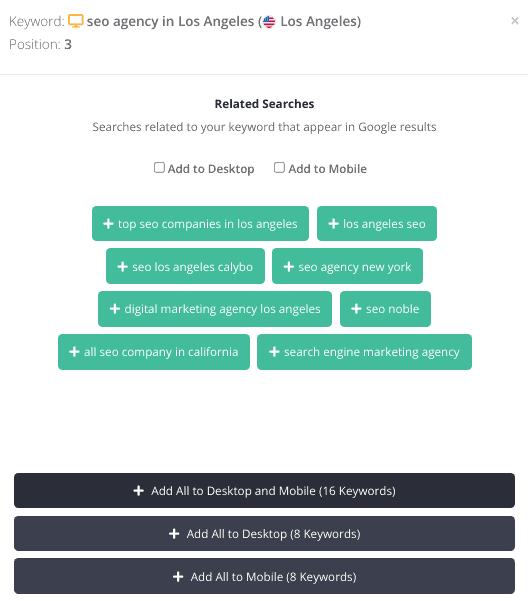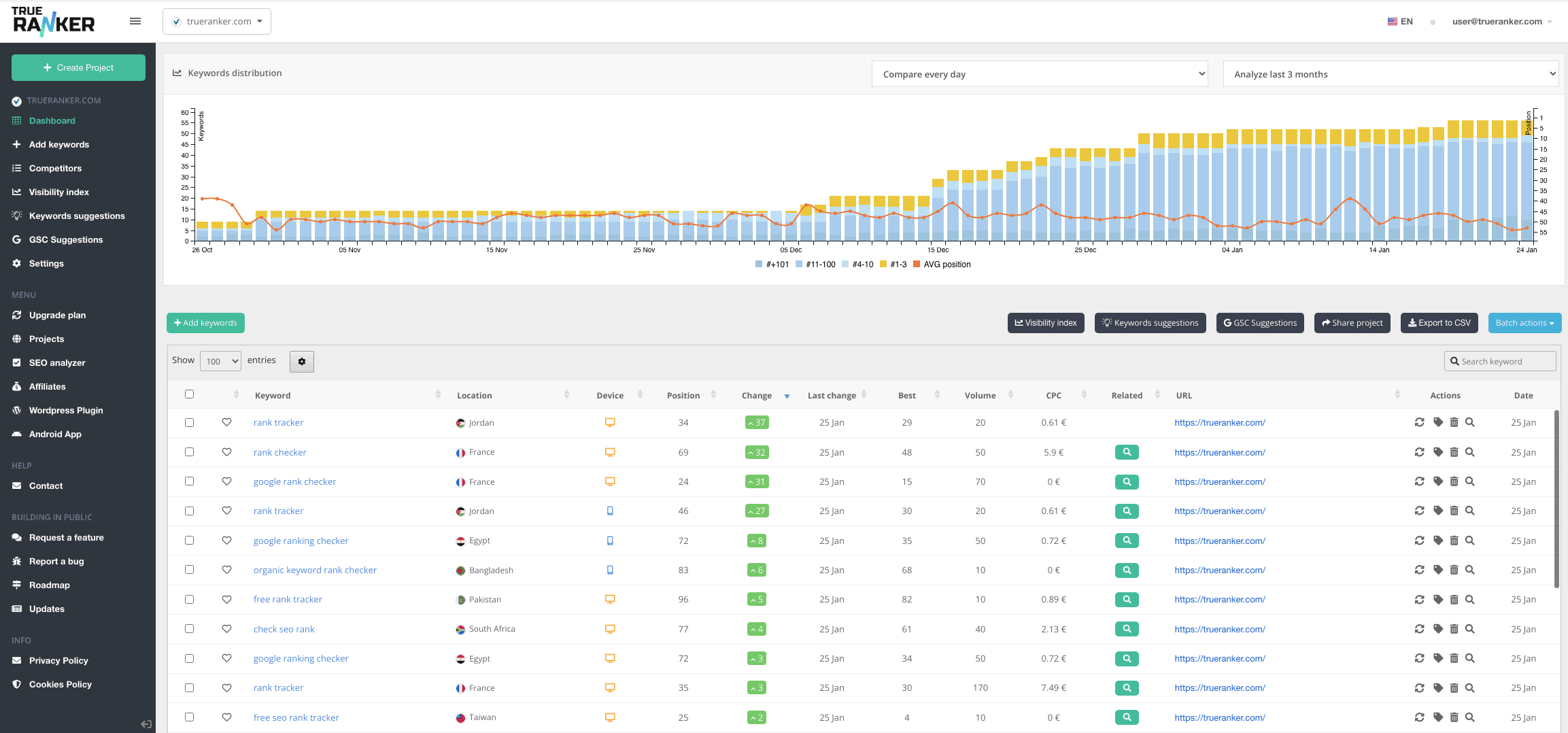When creating content for a website it is always important to previously consider the keywords to be used. The main keyword should be in the title of the entry or pages, variations of it in the different headings, and in the title and description meta tags, anchor text of links and in the alt attribute of images, the keyword should also be used.
Therefore, selecting the right keywords before creating content is a very important step in order to optimize it so that search engines, especially Google, can position it in better positions in their results pages.
The process of finding interesting keyword ideas requires dedication and the use of specific tools or techniques to find the best alternatives.
Contents
ToggleHow to discover new keywords for my website?
The process of discovering keywords for web content requires research and the use of tools to help obtain real data on trends, search volume, competition and other keyword-related information.
First of all, do you know which keywords you are already ranking for?
Before starting the search for new keywords, it is necessary to know which keywords are already positioned and how they are doing. Knowing the status of the positioned keywords, you can select the ones that have the best position in Google, to search for alternatives and related words and create new content from them, taking advantage of this positioning in the new URLs.
With the keywords that are positioned in worse positions, you can search for variations and associated long tails to position them more quickly and easily.
Therefore, the advantages of knowing the keywords already positioned before looking for new ideas are:
- Know the words that are already positioned and prevent them from competing in the ranking with other URLs (avoiding keyword cannibalization).
- Identify ranked keywords to find alternatives and changes to them in order to create new content.
- Create clusters of related keywords, to select other keywords that can enhance the positioning of these groups.
Search for keywords related to my ranked keywords
Once the keywords are already in the ranking, to find them you can use different techniques, being the most recommended:
1. Use the Google search engine
From Google’s own search engine it is possible to find keywords that can help to rank the web, existing content or new content to be implemented.
In the Google search field, when entering a keyword, the search engine suggests variations of the same that match the most used by users on the platform.
For example, if the term “SEO optimization” is entered, a drop-down menu will open with a list of the most searched terms related to that keyword, such as “SEO Google optimization“, “SEO and SEM optimization” or “SEO optimization what is it“, among others. These Google suggestions are very interesting to select new keywords to boost the positioning of the web or to develop new content based on them.
Note: “By using an asterisk before the keyword, it will be possible to obtain keyword variations in reverse (suggesting text before the keyword)“.
2. Use SEO tools
Another way to find interesting keywords is by using SEO tools such as:
- SEMrush and Ahrefs. Two of the main SEO tools that have advanced keyword utilities, although they have a high economic cost and their learning curve is not smooth.
- Google Keyword Planner. Google’s free keyword research tool (free for most of its functions).
- Google Trends. A platform to know which keywords are trending at the moment, and thus select interesting keywords to ranking content at the current moment.
3. Use a keyword-specific solution: TrueRanker
If you want to take keyword research for a website to a more professional level and with greater precision, the best alternative is TrueRanker. TrueRanker is a professional SEO solution to get the most out of keywords and SEO, which includes very interesting functions to find keyword ideas.

TrueRanker: the ideal tool for new keyword ideas
Thanks to a keyword tracking tool like TrueRanker you will be able to find the best generic, middle or long tail keywords to improve the positioning of a website, blog or eCommerce.
Below, we show the process to be performed in this SEO application in order to get the best ideas to select powerful and interesting keywords.
1. Create your project with your web URL
The first step in TrueRanker is to create a new project in order to work on keywords and SEO in a personalized way. In this tool it is possible to have different projects active simultaneously, making it possible to approach different websites independently (ideal for SEO professionals and digital marketing agencies).
When creating the project you must select the domain of the website to be analyzed and improved.
2. Add keywords
The next step is to add the keywords for which the website is ranking in Google, i.e. the main and secondary keywords that are already ranked.
If you do not know which keywords are ranked, you can add them later, as each project can be edited whenever necessary.
Once the keywords are added, TrueRanker will start its analysis process to display information about them in a customized way (this process may require some time to perform a complete and deep analysis, and present the data in graphical and numerical form).

3. Get related keywords from your ranked keywords
From the Dashboard option, TrueRanker will display a list with the keywords where you can access vital information about them, among which we can highlight:
- Name of the keyword.
- Position in the Google ranking.
- URL of the web that positions that keyword.
- Variation of the keyword (variation from a previous position).
- Search volume of the keyword.
- The cost per click (to evaluate what it would cost to position it with click per pay campaigns).
Above this list of keywords there are a series of buttons to access extra functions (visibility index, keyword suggestions, connect to Google Search Console, Share project or export the data to a document in CSV format).
By clicking on the button in the “Related” column, you will get a list of the new keywords that Google relates to yours. Once you have the list, you can improve the content of your website to start positioning for those keywords.
You can vary the country to obtain different suggested words for each one of them.
Create content for your new keywords or add them to existing content
If you have already selected the best keywords using TrueRanker, Google search engine or other tools, it is time to decide how to use them to improve your website’s SEO.
Create new content
One of the best alternatives to maximize the benefit offered by the new keywords chosen is to create new content based on them.
For example, creating a related post where the keyword is the main subject of the post. It is important to remember that to optimize the keyword should be included naturally in the content, use variations of the same, and not saturate the text to avoid penalties for key stuffing.
Other aspects to consider in the optimization of new keywords are:
- Include it in the H1 header or title header.
- Include it in the description and title meta tags.
- Use it in the anchor text of the internal links pointing to that content.
- Include it in the HTML alt text of the images that are included next to the text (to position the URL in Google’s image search engine).
Improve the ranking of existing content
Another interesting option to use new keywords is to include them in existing content. Google likes to modify old content, especially if it is to improve it and provide greater value to the user.
Using the new keywords can boost the ranking of already published content, including them in a natural way with the aim of providing new information or complementing the old text.
Getting ideas for using keywords to position a website is still a merely creative process since it is necessary to have data on the keywords in order to select the appropriate ones that can be positioned and attract a greater number of visits to the website.
Among the different alternatives to find keywords, TrueRanker is the best alternative because it is a tool specially designed to work with keywords, offering different utilities and information about them.

